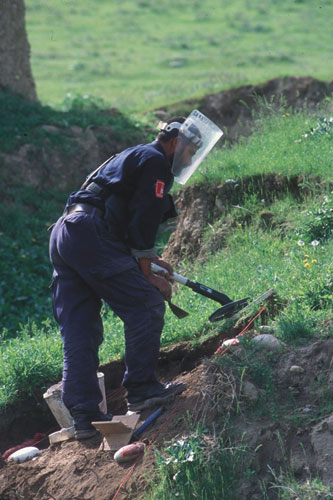Japan's Official Development Assistance White Paper 2005
Main Text > Part II ODA DISBURSEMENTS IN FISCAL YEAR 2004 > Chapter 2 Details and New Policies about Japan's ODA: Striving for Further ODA Reforms > Section 2. Measures for Each of the Priority Issues > 4. Peace-building > (5) Mine Clearance and Collection of Small Arms
(5) Mine Clearance and Collection of Small Arms
Landmines, which are buried mainly in regions where conflicts have lasted for many years such as Cambodia and Afghanistan, and small arms, which are said to be the cause of a large number of conflict victims, are a grave humanitarian issue because they have indiscriminately killed or injured even non-combatants, such as civilians including children. Furthermore, at times these landmines and weapons interfere with reconstruction and development activities or cause reoccurrence of conflicts.
The ODA Charter and the New Medium-Term Policy on ODA state, from the perspective of peace-building, that particular consideration will be given to providing assistance to enhance the capacity of developing countries regarding import and export control of weapons, prevention of illicit weapons transactions, the development of legal systems, and other areas, in order to prevent conflicts. These also state that special consideration will be given to the collection and disposal of weapons, including landmines and small arms, and to the capacity building of landmine victims and others, in order to ensure domestic stability and security within the post-conflict countries.
A. Anti-Landmine Measures
Under the "Zero Victims Program," 46 Japan has been actively providing assistance for various efforts of mine-infested countries including demining, extending over ¥18 billion since 1998. At the first Review Conference of the States Parties to the Convention on the Prohibition of the Use, Stockpiling, Production and Transfer of Anti-Personnel Mines and on Their Destruction (Ottawa Convention) held in December 2004, Japan announced its new policy on landmines in which it would continue to provide assistance for mine action on a similar scale, with an emphasis on Asia, the Middle East, and Africa according to the following three principles: (1) contribution to the "consolidation of peace," (2) valuing the perspective of "human security," and (3) close coordination between government, NGOs, the private sector, and academia in the efforts to promote technical development.
Chart 24. Disbursements of the Assistance Related to the Anti-Personnel Landmine Issue


Land mine clearing operation in Afghanistan
In FY2004, Japan continued to provide financial assistance through international organizations, Grant Aid for Humanitarian Demining and Victim Assistance, Grant Aid for Grassroots Human Security Projects, and Grant Aid for Japanese NGOs' Projects. In addition, in March 2005, Japan decided on and extended approximately ¥770 million (around US$7 million) of Emergency Grant aid through the United Nations Mine Action Service ( UNMAS ) in order to advance mine action in South Sudan where the Comprehensive Peace Agreement was concluded. Moreover, because it is highly dangerous and time-consuming to remove landmines by hand, Japan is also actively involved in the research and development of mine detection and demining technology, so that safety and efficiency of mine clearance activities will be improved. Japan will continue to call for the elimination of landmines from the world, and to actively assist mine action, while incorporating humanitarian and developmental viewpoints.
B. Efforts Related to the Collection of Small Arms
To deal with the issue of small arms, Japan is putting forth comprehensive efforts in cooperation with related organizations that aim not only to simply collect small arms, but also to prevent their illicit circulation and eliminate reasons to hold them. In Cambodia, Japan is cooperating with central and regional governments to implement the "Weapons Reduction and Development for Peace" project, and in FY2004 a decision was made to contribute to the second phase. Under this project, infrastructures such as roads, wells, bridges, and schools are repaired or built in accordance with the needs of the local residents in exchange for the collected weapons, and simultaneously, systems are made under which the government manages and registers small arms. By the end of March 2005, over 11,000 small arms were collected. Furthermore, for Sierra Leone, a decision was made to support the Arms for Development ( AFD ) Programme through the UNDP. Japan will continue to utilize the experiences gained through such projects in its active efforts related to the small arms issue.


 Next Page
Next Page